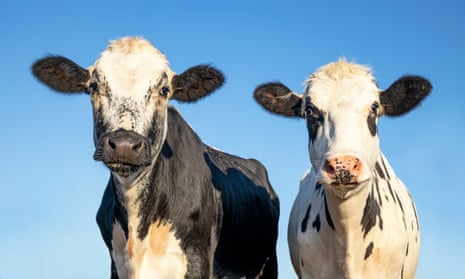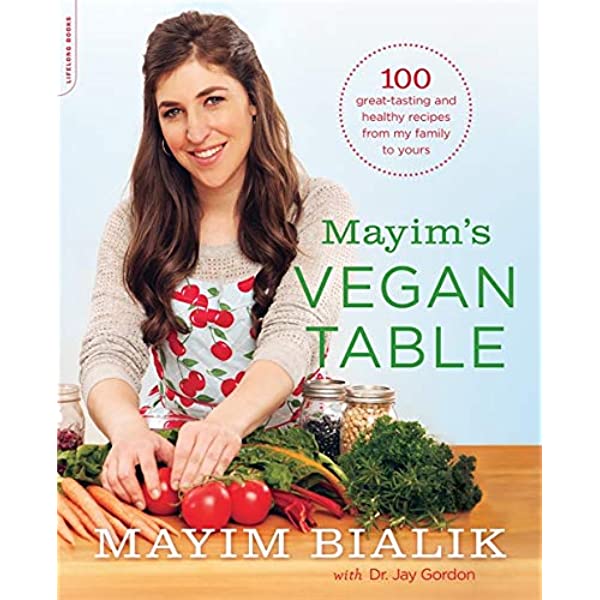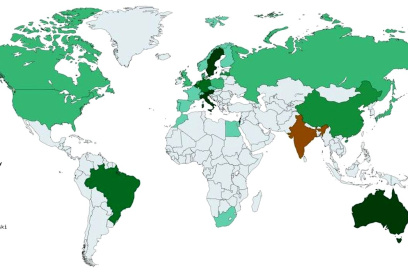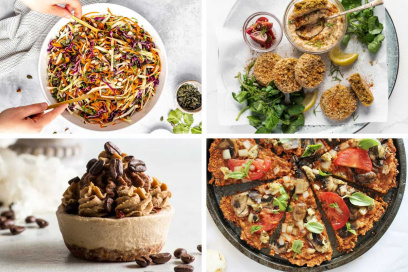Veganism has seen a meteoric rise in popularity over the years, as more individuals choose to live a plant-based lifestyle. Veganism has many health advantages, such as lower cholesterol levels, decreased risk of heart disease and lower blood pressure. Yet some still question if vegan diets provide our bodies with all essential nutrients. So the question arises: "What do most vegans suffer from?".
Following a vegan diet requires individuals to be mindful of their nutrient intake. While veganism promotes healthy living and environmental preservation, an inadequate supply of certain essential nutrients may have detrimental effects on health. Vegan diets often consist of plant-based foods, and it is essential for individuals to understand that some of these items may not provide all necessary nutrients necessary for good health.
In this blog post, we'll address the nutritional deficiencies commonly experienced by vegans--iron, vitamin B12, protein, calcium and omega-3--and offer suggestions on how to address them. By reading this post you'll gain an understanding of how vegans can enjoy a nutritional balanced diet without worrying about common deficiencies.
I. Vegan Nutrition Deficits
Iron deficiency is a common issue for vegans, as plant-based sources of iron are less easily absorbed by the body than animal-based sources. Iron is essential in the formation of red blood cells - essential for transporting oxygen throughout the body - so when anemia sets in due to insufficient iron intake. Vegans typically rely solely on plant-based foods for nutrition, so iron intake may need to be considered when planning their menus.
To combat iron deficiency in vegans, the solution lies in selecting iron-rich plant-based foods and maintaining a balanced diet. Legumes, nuts and seeds such as soybeans, lentils and pumpkin seeds are excellent sources of this essential mineral. Leafy green veggies like spinach, kale or broccoli also boast high levels of iron. But for optimal absorption of this iron the body needs vitamin C; citrus fruits such as oranges, strawberries or kiwis are high in this vitamin that can be combined with iron-rich foods for maximum absorption results.
For instance, lentil soup with spinach and tomatoes can provide an iron- and vitamin C-rich meal. Iron-fortified cereals that are vegan-friendly also make excellent choices to help meet recommended iron intake requirements. While vegans can obtain sufficient amounts of iron through plant-based foods, it may not be as easy to get as much iron as non-vegans do.
In addition to the sources mentioned above, cooking with a cast-iron skillet is an effective way to increase iron intake. As it cooks food, it adds some iron into the meal which may support vegans' needs for iron. However, taking too much iron may cause toxicity; thus it's important to stay within recommended upper limits of daily iron consumption.
Overall, iron intake remains a cause for concern for vegans. To combat the potential risk of iron deficiency in vegans, we recommend eating a nutritious, balanced diet along with plenty of vitamin C to ensure adequate iron absorption. In the next section, we will address another essential nutrient that vegans may lack: Vitamin B12.
II. Common Issues in Vegan Diet
Vitamin B12 deficiency is often encountered among vegans due to its predominantly animal-based source. Vitamin B12 plays a vital role in our nervous system, red blood cell formation and DNA synthesis - so it's crucial that we get enough of it through food sources. Therefore, vegans must ensure they consume adequate levels of this vital nutrient daily.
Vegans may experience vitamin B12 deficiencies if they do not supplement their diet adequately. Common sources of this vital nutrient for vegans include fortified plant-based milk, vegan-friendly vitamin supplements and nutritional yeast. Nutritional yeast is an inactive form of yeast with a cheesy/nutty flavor that's often served as a condiment. Not only does it provide excellent sources of B12 but is also an easy addition to the vegan diet.

Vegans avoid all animal products, making it essential to supplement their diet with vitamin B12. Contrary to popular belief, seaweed, spirulina and fermented foods do not contain enough levels of this vital nutrient for adequate daily needs. The most reliable way to ensure you're getting enough Vitamin B12 is either through taking a supplement recommended by a healthcare professional or eating fortified vegan-friendly foods.
Vegans must ensure a sufficient intake of vitamin B12, but also be wary of potential deficiencies in folic acid - which works together with vitamin B12. Folic acid deficiencies can lead to megaloblastic anemia, characterized by red blood cells that are abnormally large. Foods like avocados, beans, legumes and dark leafy greens are packed with folic acid which may reduce the risk of this deficiency for vegans.
In conclusion, vitamin B12 intake remains a top concern for vegans. Taking regular B12 supplements or consuming fortified foods can help address this potential deficiency, but to achieve maximum nutrition it's best to combine vitamin B12-rich foods with folic acid-rich foods in your diet - creating a balanced and nutritious balance that reduces the risk of deficiencies. Now let us move on to protein in our next section.
III. Overcoming Nutrient Deficits in Veganism
Veganism offers us the opportunity to address nutrient deficiencies.
Protein deficiency is one of the biggest concerns for vegans considering a lifestyle change. Our bodies require protein to build tissues and muscles, support an efficient immune system, and regulate hormones - all of which vegans can obtain through plant-based sources such as legumes, nuts, seeds and grains. Animal products provide us with excellent sources of this essential nutrient but vegans can get enough through a balanced diet of legumes, nuts, seeds and grains.
Vegans must consume a variety of plant-based proteins in order to get all of the essential amino acids found in animal-based products. Amino acids are fundamental building blocks for protein, and our bodies require 20 different kinds to function optimally. Of these essential amino acids, nine are essential - meaning our bodies cannot manufacture them and must be obtained through food sources.
The challenge with vegan protein is that most plant-based foods lack one or more essential amino acids. For instance, rice is an incomplete protein due to its low levels of lysine relative to other amino acids; on the other hand, beans have high levels of lysine but low levels of methionine. Therefore, eating complementary proteins that make up for each other's deficiencies are key when creating complete proteins; pairing beans with whole grains or seeds for vegans will help vegans obtain complete proteins.
Beyond the plant-based foods mentioned above, soy products like tofu, lentils, chickpeas and tempeh provide vegans with an excellent source of protein. Furthermore, most plant-based proteins come with other essential nutrients that promote good nutrition without the risk of high cholesterol levels found in animal-based proteins- even lean meats!
Furthermore, high-protein vegan snacks like roasted chickpeas or edamame with hummus are an ideal way to ensure adequate protein intake. Dehydration and training may also increase daily protein needs; thus, it's essential to factor these factors in when calculating protein requirements.
In conclusion, vegans can achieve adequate levels of protein through a balanced and varied diet rich in proteins. Eating complementary proteins, whole-grain carbohydrates, and fiber-rich produce will give vegans the necessary amino acids while encouraging them to lead a healthy lifestyle. The next section will discuss calcium deficiency among vegans and how it can be addressed.
IV. Concerns With Plant-Based Eating Concerns

Calcium deficiency is a common nutritional issue among vegans. Calcium plays an essential role in building and maintaining healthy teeth, bones, and muscle function; although dairy products provide the most reliable source of this mineral, vegans can still get their fill from plant-based sources like leafy greens, seeds, and nuts.
Dark leafy greens such as spinach, bok choy and collard greens are high in calcium; adding them to a vegan diet can ensure that you get enough for optimal calcium absorption. You could also try calcium-fortified plant-based milk or orange juice for another calcium-rich beverage option.
Vegans don't have to rely solely on plant-based sources for calcium intake; there are other viable options such as calcium-fortified tofu. This food item provides up to 43% of your daily recommended value of calcium! In addition, sesame seeds, almonds and chia seeds are excellent sources of this essential mineral that can be added to meals or enjoyed as a snack.
Furthermore, vegans should consume foods high in vitamin D, which is essential for calcium absorption. Vitamin D helps with this process and naturally occurs when exposed to sunlight; however, since many vegans avoid direct sun exposure or live in places with limited sunlight exposure, taking supplements or eating fortified foods may help supplement this deficiency.
In conclusion, while dairy products are an excellent source of calcium for vegans, a balanced and varied diet rich in plant-based sources of this essential mineral can provide them with adequate levels. Vegans should also ensure they get enough vitamin D from supplements or fortified foods if necessary. In the final section, let us recapitulate our key takeaways and offer our conclusion.
Conclusion
Adopting a vegan lifestyle can have health benefits like lower blood pressure, decreased risk of heart disease, and improved digestion. It is essential for vegans to be mindful of their nutrient intake and address any common deficiencies that may occur. These issues could include anemia, fatigue, and slow cognitive function.
Understanding the risks of nutrient deficiencies is important, but proper preparation and awareness can help avoid them altogether. By including plant-based proteins and complementary proteins into their meals, sourcing vitamin B12 from fortified foods, and rotating fruit and vegetable choices regularly, vegans can ensure they get all necessary nutrients through their food sources.
Vegans must be aware of any potential nutritional deficiencies and take proactive steps to keep their diet balanced and healthy. In this blog post, we've identified five common deficiencies among vegans - iron, vitamin B12, protein, calcium and omega-3 - along with practical solutions for overcoming them.
Today, it is more important than ever for individuals to lead a healthy and balanced lifestyle. A vegan diet can be an ideal way to accomplish this; while it's essential to be aware of nutrient deficiencies when following this dietary pattern, maintaining good nutrition is possible. With informed choices made, veganism can be both healthy and fulfilling with the potential to promote longevity as well.




